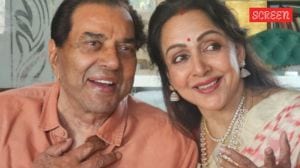Prime Minister Narendra Modi renewed his pitch for a nationwide Uniform Civil Code (UCC) on Saturday (December 14), recalling the views of veteran leaders Dr BR Ambedkar and KM Munshi on the matter.
During a discussion in Lok Sabha on the “Glorious Journey of 75 Years of the Constitution of India”, Modi said, “The Constituent Assembly engaged in a long and deep discussion on the UCC. They decided that it would be good for the future elected government to… implement the UCC in the country. That is what they directed… Babasaheb Ambedkar greatly advocated for ending religion-based personal laws.”

He added: “(Congress leader) KM Munshi described the UCC as being integral for national unity and modernisation.” The PM said that keeping in mind the sentiments of the people who drafted the Constitution, the government was exerting its full force to have a “secular civil code”.
UCC refers to the idea of a common set of laws governing personal matters (succession, marriage, etc.), instead of the current system, where different religious communities in India come under different sets of personal laws. It has been debated since the inception of the Indian Constitution. Here is a look at what the two leaders said and how the discussion was concluded.
What KM Munshi said on UCC
The debate in the Constituent Assembly on November 23, 1948, focused on a draft Article on the UCC, to be included in the “Directive Principles of State Policy”. This section included the broad ideas that the state ought to incorporate in policymaking, though it would not be legally bound to abide by them.
Draft Article 35 said, “The State shall endeavour to secure for the citizens a uniform civil code throughout the territory of India” and was put to vote.
Several members of the Constituent Assembly suggested amendments to it, raising concerns about its reception by religious communities. Mohamad Ismail Sahib of the Indian Union Muslim League said, “Now why do people want a uniform civil code, as in article 35? Their idea evidently is to secure harmony through uniformity. But I maintain that for that purpose it is not necessary to regiment the civil law of the people including the personal law. Such regimentation will bring discontent and harmony will be affected.”
Story continues below this ad
Another member named Naziruddin Ahmad said, “In fact, each community, each religious community has certain religious laws, certain civil laws inseparably connected with religious beliefs and practices. I believe that in framing a uniform draft code these religious laws or semi-religious laws should be kept out of its way.” Likely in anticipation of such opposition, the article was only suggested to be incorporated in the DPSPs.
During the debate, Munshi supported having a UCC and countered its criticism, about it being “tyrannical” to minorities. “Is it tyrannical? Nowhere in advanced Muslim countries the personal law of each minority has been recognised as so sacrosanct as to prevent the enactment of a Civil Code.”
He also addressed the Hindus, saying, “I know there are many among Hindus who do not like a uniform Civil Code, because they take the same view as the honourable Muslim Members who spoke last. They feel that the personal law of inheritance, succession etc. is really a part of their religion. If that were so, you can never give, for instance, equality to women. But you have already passed Fundamental Right(s) to that effect and you have an article here which lays down that there should be no discrimination against sex. Look at Hindu Law; you get any amount of discrimination against women; and if that is part of Hindu religion or Hindu religious practice, you cannot pass a single law which would elevate the position of Hindu women to that of men. Therefore, there is no reason why there should not be a civil code throughout the territory of India.”
Munshi also linked UCC with national unity. “There is one important consideration which we have to bear in mind – and I want my Muslim friends to realise this – that the sooner we forget this isolationist outlook on life, it will be better for the country. Religion must be restricted to spheres which legitimately appertain to religion, and the rest of life must be regulated, unified and modified in such a manner that we may evolve, as early as possible a strong and consolidated nation… I hope our friends will not feel that this is an attempt to exercise tyranny over a minority; it is much more tyrannous to the majority.”
Story continues below this ad
What Ambedkar said on UCC
Ambedkar said during this debate that he would not discuss the merits or demerits of India having a UCC, but advocated for Article 35.
“My friend, Mr. Hussain Imam, in rising to support the amendments, asked whether it was possible and desirable to have a uniform Code of laws for a country so vast as this is. Now I must confess that I was very much surprised at that statement, for the simple reason that we have in this country a uniform code of laws covering almost every aspect of human relationship. We have a uniform and complete criminal Code operating throughout the country, which is contained in the Penal Code and the Criminal Procedure Code,” he said.
“…Members.. say that the Muslim personal law, so far as this country was concerned, was immutable and uniform through the whole of India. Now I wish to challenge that statement… up to 1935 the North-West Frontier Province was not subject to the Shariat Law. It followed the Hindu Law in the matter of succession and in other matters”. He also gave examples of other regions, such as the United Provinces, the Central Provinces and Bombay, having been governed by the Hindu Law in certain matters periodically.
Later on December 2, he again spoke on the issue during another discussion about the state’s power to legislate on religious matters. “I personally do not understand why religion should be given this vast, expansive jurisdiction so as to cover the whole of life and to prevent the legislature from encroaching upon that field. After all, what are we having this liberty for? We are having this liberty in order to reform our social system, which is so full of inequities, so full of inequalities, discriminations and other things… It is, therefore, quite impossible for anybody to conceive that the personal law shall be excluded from the jurisdiction of the State.”
Story continues below this ad
He added, “Having said that, I should also like to point out that all that the State is claiming in this matter is a power to legislate… Therefore, no one need be apprehensive of the fact that if the State has the power, the State will immediately proceed to execute or enforce that power in a manner that may be found to be objectionable by the Muslims or by the Christians or by any other community in India.” This, he said, was because the government’s exercise of powers “must reconcile to the sentiments of different communities”.
What happened at the end of the debate?
Article 35 was put to vote and it passed. Later, it was renumbered as Article 44 of the Indian Constitution.
Constitutional law expert Faizan Mustafa earlier wrote in The Indian Express, “While Article 44 uses the words “state shall endeavour”, other Articles in the ‘Directive Principles’ chapter use words such as “in particular strive”; “shall in particular direct its policy”; “shall be obligation of the state” etc… All this implies that the duty of the state is greater in other directive principles than in Article 44.”








































